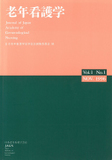Japanese
English
- 販売していません
- Abstract 文献概要
- 参考文献 Reference
施設・病院に入っている老人8名の生活リズムを観察し,その結果から援助方針をたて看護を行った.観察の結果,生活リズムの乱れがあった4名の生活リズムの有り様とその要因,ならびに看護について分析し,以下の知見を得た.(1)生活リズムの振幅が小さくなっているケースがあり,他者に頼るしかない寝たきりの老人に特有の生活リズムであった.(2)生活リズムの周期に乱れを生じたケースがあり,痴呆性老人に多い障害と考えられた.(3)リズムが形成されにくいケースがあり,これは病院に入院しているケースであった.その要因として無リズムで刺激の多い環境と,過敏で反応性の高い身体状況が挙げられた.(4)特別養護老人ホームは生活リズムがととのえられやすく,病院は妨げられやすい環境であった.(5)生活リズム回復への共通した援助として,苦痛を緩和し心地よいケアを継続して行うことが挙げられた.
We conducted a study of eight elderly people at two nursing homes and one hospital to observe their daily rhythms (sleep/activity patterns), and we provided care based on the results of the observation. Four subjects were found to have irregular daily rhythms. We analyzed the characteristics and causes of these irregular daily rhythms, as well as the care provided. The following findings were obtained. (1) There were cases in which the subject's daily rhythm had only slight fluctuations (very little activity). This was characteristic of elderly who are bedridden and totally dependent on others. (2) There were cases in which the cycle of the subject's daily rhythm was disrupted. This is considered to be a common disorder of elderly with dementia. (3) A elderly patient at hospital showed difficulty in forming a regular daily rhythm (set pattern of activity). We believe the patient at hospital have fewer changes and too stimuli in her daily living, and that her physical condition tend to be oversensitive to the hospital environment. (4) We have found that the two nursing homes were offer in good environment for helping elderly people recover their regular daily rhythm. The hospital environment, on the other hand, tends to hamper this recovery. (5) Care which eases pain and provides comfort are considered effective for helping elderly people regain their regular daily rhythms.
Copyright © 1996, Japan Academy of Gerontological Nursing All rights reserved.


